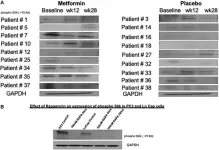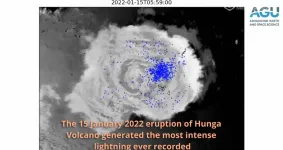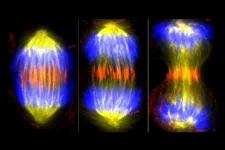(Press-News.org) Critical insights into why airborne viruses lose their infectivity have been uncovered by scientists at the University of Bristol. The findings, published in the Journal of the Royal Society Interface today [21 June], reveal how cleaner air kills the virus significantly quicker and why opening a window may be more important than originally thought. The research could shape future mitigation strategies for new viruses.
In the first study to measure differences in airborne stability of different variants of SARS-CoV-2 in inhalable particles, researchers from Bristol’s School of Chemistry show that the virus has become less capable of surviving in the air as it has evolved from the original strain through to the ‘Delta’ variant.
Dr Allen Haddrell, the study’s lead author and Senior Research Associate in Bristol’s School of Chemistry, explained: “Aerosol particles, exhaled when infected individuals breathe, speak or cough, can transmit viruses – but how and why viruses lose infectivity once they are circulating around in these airborne particles has been widely debated.”
To conduct the research, the team used a next generation bioaerosol technology instrument that they developed called CELEBS (Controlled Electrodynamic Levitation and Extraction of Bioaerosols onto a Substrate), that allowed them to probe the survival of different SARS-CoV-2 variants in laboratory generated airborne particles that mimic exhaled aerosol. They examined how environmental factors, such as temperature and humidity, particle composition and the presence of acidic vapours such as nitric acid alter virus infectivity over a 40-minute period.
Through manipulating the gaseous content of the air, the team confirmed that the aero-stability of the virus is controlled by the alkaline pH of the aerosol droplets containing the virus. Importantly, they describe how each of the SARS-CoV-2 variants has different stabilities while airborne, and that this stability is correlated with their sensitivities to alkaline pH conditions.
The high pH of exhaled SARS-CoV-2 virus droplets is likely a major driver of the loss of infectiousness, so the less acid in the air, the more alkaline the droplet, the faster the virus dies. Opening a window may be more important than originally thought as fresh air with lower carbon dioxide, reduces acid content in the atmosphere and means the virus dies significantly quicker.
Dr Haddrell added: “Our results indicate that the high pH of exhaled aerosol drives the loss of viral infectivity. So, any gas that affects aerosol pH may play a role in how long the virus remains infectious in the air. For example, bleach gives off acidic vapour that may increase SARS-CoV-2 stability in the aerosol phase. Conversely, ammonia which gives of alkaline vapour may have the opposite effect.”
The findings provide valuable insights into why and how aerosolised viruses lose their infectivity, setting the stage for the design of new strategies to mitigate risk.
Jonathan Reid, Director of Bristol Aerosol Research Centre and Professor of Physical Chemistry in the School of Chemistry at the University of Bristol, and one of the corresponding authors, said: “There are numerous factors that affect the transmission of airborne viruses, and these are often confounded with physical and environmental parameters that can affect viral longevity in the aerosol phase such as temperature, relative humidity, air movement and UV light.
“Our findings broaden our understanding of how environmental factors affect airborne stability of SARS-CoV-2 and other viruses, which will help us design better safety and mitigation strategies to reduce disease transmission. We now intend to explore the role of pH further through studying the role that carbon dioxide has on the risk of SARS-CoV-2 transmission.”
The research was funded by the Biotechnology and Biological Sciences Research Council (BBSRC), the National Institute for Health and Care Research (NIHR)-UK Research and Innovation (UKRI) rapid COVID-19 call, the Elizabeth Blackwell Institute (EBI), the University of Bristol and the PROTECT COVID-19 National Core Study on transmission and environment, managed by the Health and Safety Executive (HSE).
END
Scientists discover critical factors that determine the survival of airborne viruses
Virus in the aerosol dies quicker in cleaner air
2023-06-21
ELSE PRESS RELEASES FROM THIS DATE:
UK's young people at risk of leaving school without vital knowledge of reproductive health, study finds
2023-06-21
Pupils in the UK are not learning about potentially life-changing issues such as endometriosis, infertility, and miscarriage, according to a new study of curricula in science and in relationships and sex education.
Researchers from University College London (UCL) looked at what schools are expected to teach 14–18-year-olds across the UK, using curriculum requirements and specifications set by exam boards. Findings, published today in the peer-reviewed journal Human Fertility, demonstrate significant gaps and variations in what pupils are taught ...
Study explores climate change impacts on seagrass meadows
2023-06-21
Hidden beneath the waves of coastal waters lies an important member of the marine food chain – seagrasses. These marine meadows are in many ways the unsung heroes of the ocean, benefiting humans and the planet by producing oxygen, removing carbon dioxide from the air, and providing food and habitat for marine life. But these submerged savannahs may be in danger of disappearing, according to a new Stanford study that modeled the distribution of seagrass species around the world at two different timepoints in the future.
Climate change is expected to hit marine species hard, in part because oceans absorb an estimated ...
Helping define the impact of “art” in education
2023-06-20
Growing up, Brian Kisida always enjoyed going to school. He especially enjoyed the broad spectrum of subjects he was able to explore, including the arts. Now, as an assistant professor in the Truman School of Government and Public Affairs at the University of Missouri, he is researching the relationship between arts education and student success.
Over the years, Kisida, an expert on education policy, has seen the culture of education shift dramatically.
“I saw the impact that the test obsessed culture had on schooling, students’ mental health and enjoyment of learning,” Kisida said. “I wanted to know why we were seeing these changes that seem to not be in line ...
Precious1GPT: multimodal transfer learning for aging clock development and target discovery
2023-06-20
“The development of Precious1GPT [...] has demonstrated the potential of our approach in deciphering the molecular mechanisms of aging.”
BUFFALO, NY- June 20, 2023 – A new research paper was published in Aging (listed by MEDLINE/PubMed as "Aging (Albany NY)" and "Aging-US" by Web of Science) Volume 15, Issue 11, entitled, “Precious1GPT: multimodal transformer-based transfer learning for aging clock development and feature importance analysis for aging and age-related disease target discovery.”
Aging is a complex ...
Metformin's role in preventing metabolic syndrome during androgen deprivation therapy: a Phase II study
2023-06-20
“[...] we found no impact of the addition of metformin to [androgen deprivation] therapy on risk of metabolic syndrome associated with castration therapy and no additional anti-tumor effects.”
BUFFALO, NY- June 20, 2023 – A new research paper was published in Oncotarget's Volume 14 on June 19, 2023, entitled, “Utilizing metformin to prevent metabolic syndrome due to androgen deprivation therapy (ADT): a randomized phase II study of metformin in non-diabetic men initiating ADT for advanced prostate cancer.”
Androgen deprivation therapy (ADT) can lead to metabolic syndrome (MS) and is implicated in ADT-resistance. Metformin showed antineoplastic ...
Study: Microtargeting works, just not the way people think
2023-06-20
Recent U.S. elections have raised the question of whether “microtargeting,” the use of extensive online data to tailor persuasive messages to voters, has altered the playing field of politics.
Now, a newly-published study led by MIT scholars finds that while targeting is effective in some political contexts, the “micro” part of things may not be the game-changing tool some have assumed.
“In a traditional messaging context where you have one issue you’re trying ...
Brazilian fossil provides earliest evidence of evolutionary trait that enabled dinosaurs to become giants
2023-06-20
The missing link has just been found between the earliest dinosaurs, whose size ranged from a few centimeters to at most 3 meters in length, and more recent giants that could be more than twice the length of a bus and have so much appeal to the popular imagination.
Macrocollum itaquii, buried 225 million years ago in what is now Agudo, a town in Rio Grande do Sul state, South Brazil, is the oldest dinosaur studied hitherto with structures called air sacs.
These bone cavities, which persist in present-day ...
What role does alternative splicing play in neurodegenerative disease?
2023-06-20
RIVERSIDE, Calif. -- Alternative splicing, a clever way a cell generates many different variations of messenger RNAs — single-stranded RNAs involved in protein synthesis — and proteins from the same stretch of DNA, plays an important role in molecular biology. Progressing rapidly, the field of alternative splicing is a complex topic and the scientific literature on it is already extensive.
David Nikom, a student in the UC Riverside Neuroscience Graduate Program, and his advisor, Sika Zheng, an associate professor of biomedical sciences in the UCR School of Medicine and director of the Center ...
Tonga’s Hunga eruption produced the most intense lightning ever recorded
2023-06-20
American Geophysical Union
Release No. 23-26
20 June 2023
For Immediate Release
This press release and accompanying multimedia are available here: https://news.agu.org/press-release/tongas-hunga-eruption-produced-the-most-intense-lightning-ever-recorded/
Additional study highlights:
The 15 January eruption lasted at least 11 hours, several hours longer than previously known
The plume produced the highest-altitude lightning flashes ever measured, 20 to 30 kilometers (12 to 19 miles) above sea level
Lightning “surfed” giant waves that rippled through volcanic plume
Lightning data ...
Rensselaer researcher to investigate the mechanics of mitosis to combat cancer
2023-06-20
It is a scary fact that one in two women and one in three men in the United States will develop some form of cancer in their lifetime. One of the hallmarks of many cancers is the occurrence of errors during the cell division process called mitosis. Therefore, critical to enhancing treatments or perhaps even finding a cure for cancer and other diseases, is developing a better understanding of how mitosis works in both healthy and diseased cells.
Rensselaer Polytechnic Institute’s Scott Forth, Ph.D., assistant professor of biological sciences ...
LAST 30 PRESS RELEASES:
University of Ottawa Heart Institute, the University of Ottawa and McGill University launch ARCHIMEDES to advance health research in Canada
The world’s largest brain research prize awarded for groundbreaking discoveries on how we sense touch and pain
Magnetofluids help to overcome challenges in left atrial appendage occlusion
Brain-clearing cells offer clues to slowing Alzheimer’s disease progression
mRNA therapy restores fertility in genetically infertile mice
Cloaked stem cells evade immune rejection in mice, pointing to a potential universal donor cell line
Growth in telemedicine has not improved mental health care access in rural areas, study finds
Pitt scientists engineer “living eye drop” to support corneal healing
Outcomes of older adults with advanced cancer who prefer quality of life vs prolonging survival
Lower music volume levels in fitness class and perceived exercise intensity
Of crocodiles, counting and conferences
AERA announces 2026 award winners in education research
Saving two lives with one fruit drop
Photonic chips advance real-time learning in spiking neural systems
Share of migratory wild animal species with declining populations despite UN treaty protections worsens from 44% to 49% in two years; 24% face extinction, up 2%
One in 20 babies experiences physical abuse, global review finds
Tundra tongue: The science behind a very cold mistake
Targeting a dangerous gut infection
Scientists successfully harvest chickpeas from “moon dirt”
Teen aggression a warning sign for faster aging later in life
Study confirms food fortification is highly cost-effective in fighting hidden hunger across 63 countries
Special issue elevates disease ecology in marine management
A kaleidoscope of cosmic collisions: the new catalogue of gravitational signals from LIGO, Virgo and KAGRA
New catalog more than doubles the number of gravitational-wave detections made by LIGO, Virgo, and KAGRA observatories
Antifibrotic drug shows promise for premature ovarian insufficiency
Altered copper metabolism is a crucial factor in inflammatory bone diseases
Real-time imaging of microplastics in the body improves understanding of health risks
Reconstructing the world’s ant diversity in 3D
UMD entomologist helps bring the world’s ant diversity to life in 3D imagery
ESA’s Mars orbiters watch solar superstorm hit the Red Planet
[Press-News.org] Scientists discover critical factors that determine the survival of airborne virusesVirus in the aerosol dies quicker in cleaner air






